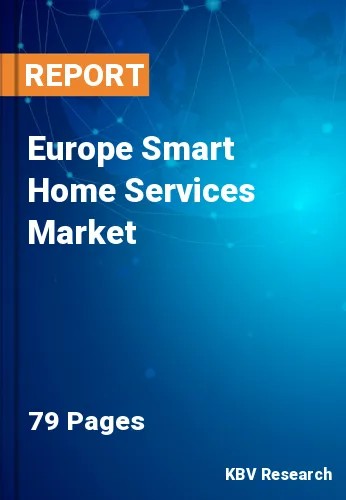The Europe Smart Home Services Market would witness market growth of 9.7% CAGR during the forecast period (2022-2028).
Smart home automation refers to any collection of devices, systems, or appliances that are connected to a single network and may function autonomously and remotely. A linked home is a broader phrase for a house's technology when it operates as a unified system. As an example, the home's thermostat, lights, audio speakers, security cameras, TVs, locks, and appliances are all integrated into a unified system that can be controlled by a smartphone or mobile touchscreen device. Smart home automation offers users access to previously impossible levels of high-tech utility and aesthetics. As technology development continues, the potential for smart home automation to improve the quality of life for customers will increase.
Home automation refers to the automated and electronic control of a home's operations, activities, and equipment. It implies that customers may simply handle the home's appliances and functions online, therefore increasing convenience, enhancing security, and reducing family expenditures. Over the Internet, a network of communication, hardware, and electronic interfaces known as home automation link ordinary gadgets. Whether the user is at home or away, they may operate any device with a smartphone or tablet, since they are all equipped with sensors and Wi-Fi connectivity. It enables users to control a variety of operations, including turning on the lights, locking the door, and adjusting the temperature in their house.
Europe is implementing a variety of steps to improve the region's energy efficiency. Due to the region's high energy consumption, European governments and residents are emphasizing energy conservation. Energy efficiency underpins both the transition to a resource-efficient economy and the EU's Europe 2020 Strategy for sustainable, intelligent, and equitable growth. Energy efficiency is one of the most cost-effective approaches to boosting energy supply security, reducing greenhouse gas emissions, and reducing other pollutant emissions. Europe's primary energy source is typically characterized by its energy efficiency. To meet its long-term energy and climate objectives, the Union aimed to reduce its primary energy consumption by 20% by 2020. This objective was reiterated in the Commission's Energy 2020 Communication.
The Germany market dominated the Europe Smart Home Services Market by Country in 2021, and would continue to be a dominant market till 2028; thereby, achieving a market value of $710.1 million by 2028. The UK market is showcasing a CAGR of 8.8% during (2022 - 2028). Additionally, The France market would register a CAGR of 10.5% during (2022 - 2028).
Based on Type, the market is segmented into IoT Services for Smart Appliances, IoT Services for Control & Connectivity Devices and IoT Services for Security & Surveillance Equipment. Based on countries, the market is segmented into Germany, UK, France, Russia, Spain, Italy, and Rest of Europe.
Free Valuable Insights: The Global Smart Home Services Market will Hit $10.9 Billion by 2028, at a CAGR of 10.2%
The market research report covers the analysis of key stake holders of the market. Key companies profiled in the report include Johnson Controls International PLC, Lumen Technologies, Inc., Comcast Corporation, Charter Communications, Inc., Telus International (Telus Communications Inc.), Vivint Smart Home, Inc., ADT, Inc. (Apollo Global Management, Inc.), Trane Technologies PLC, Rexel Group, and Calix, Inc.
By Type
By Country
Our team of dedicated experts can provide you with attractive expansion opportunities for your business.

